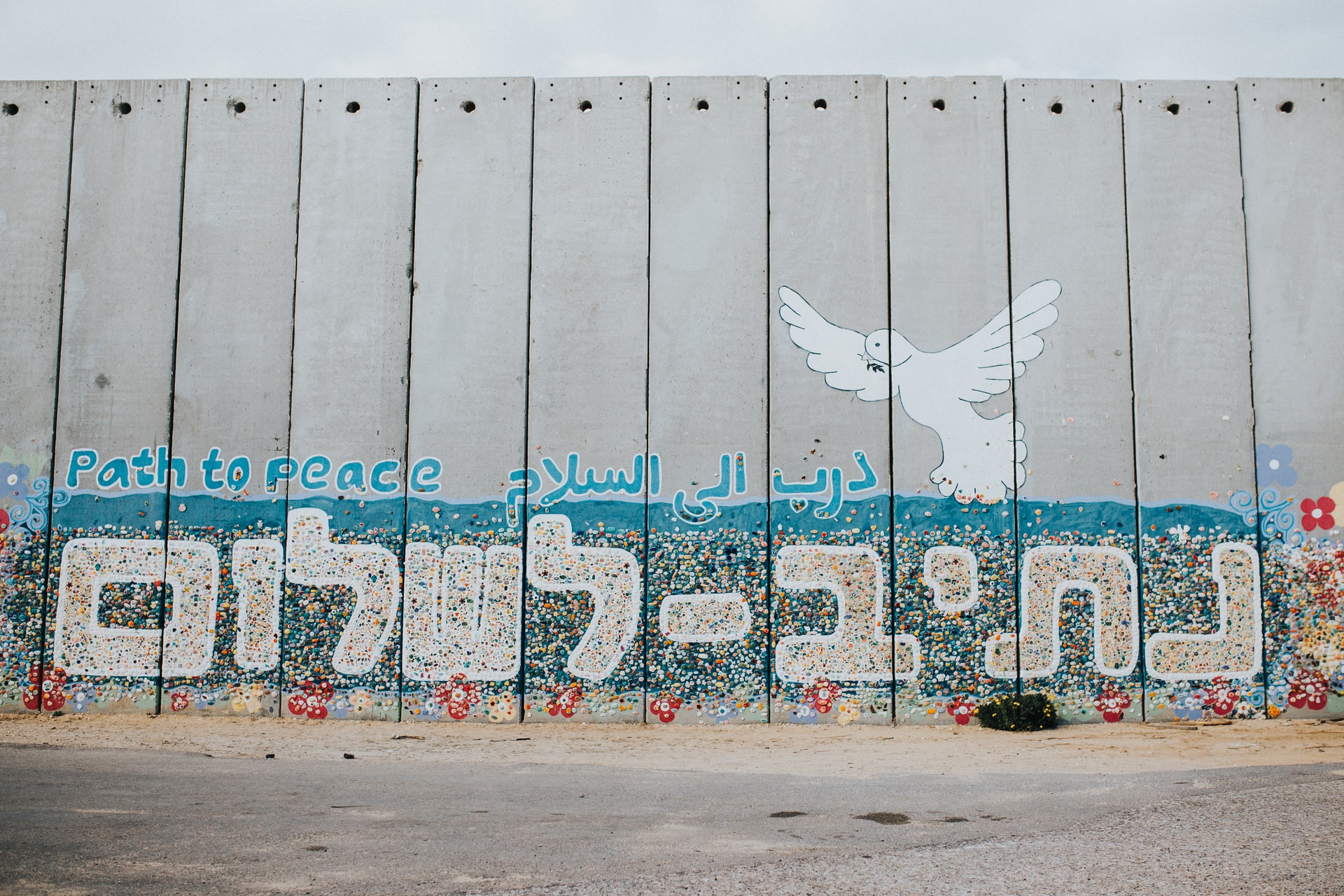
OPINION. There are ways to solve the Israel-Palestine conflict, argues Tomas Nordberg in this the third of articles on the Israeli-Palestinian conflict. The Oslo Accords provide the guidelines for reconciliation. We must go to the roots of the conflict to arrive at its solutions. For conflict solution, not just management, both sides need to exhibit authentic acceptance of the other side rooted deep in its culture. The starting step is for Israel to relieve the economic plight of people living under its occupation, he writes.
This article was originally published by Tomas Nordberg via Global Bar Magazine.
The views and opinions expressed in this article are those of the author.
The regional context is plagued by turbulence and disorder. The conflicts intersect each other and the Israel-Palestinian conflict has a bearing on the internal conflicts of scores of countries in the region. Resolving the Israeli-Palestinian conflict would remove a major hindrance to better relations between the nation-states in the region which are in agreement regarding the need to prevent Iran from becoming a regional hegemon.
Israel is under attack by groupings such as Hamas and Hezbollah. Acceptance by the Arab states is important for the Jewish state, especially given current population tendencies. There are already more Arabs than Jews between the Jordan River and the Mediterranean Sea. The land for peace formula is being challenged by a growing share of the Israeli population that wants to separate from the Palestinians. Some orthodox Jews wishes that Israel would annex and rule over what they define as historical Israel. And the two-state idea is questioned by more and more people on both sides to the conflict. The negotiations, mediations and facilitations of negotiations keep failing, thus providing more backing for Hamas. The region-wide revolution the Arab Spring didn´t succeed. To set itself on firmer footing, Israel needs a peace agreement with the Palestinians similar to its treaties with Jordan and Egypt.
Read also: Why are the peace initiatives failing to bring lasting peace?
The parties are not starting from scratch. Previous negotiation processes have fixed the contours of the final status issues, namely refugees, the status of Jerusalem, security and territorial issues. The Trump Administration showed the inadmissibility of discontinuing funding as a means to achieve peace. The parties should negotiate a system that compensates refugees while keeping in mind that an unrestricted right of return is not feasible. Both Prime Minister Olmert and Mahmoud Abbas during President Bush presented options for a limited number of refugees returning. Proposing a compensation fund would incentivize the Palestinians to sign a peace agreement.
Worries about Security
Israel is rightly worried about its security. So, Israel should be offered membership in the Organization for Security and Co-operation in Europe (OSCE) to alleviate these concerns. On the Palestinian side, more funding is required for creating the Palestinian state and housing. Security cooperation must complement civilian state-building; a successful example is the US and Jordanian combined training of a security force in the West Bank. And the Palestinian leadership should show willingness to compromise on the final status issue of Jerusalem. The city will most likely not be divided.
Unless the Palestinians construct a viable state, Israelis will go on to experience dread of being attacked. There is a vicious circle here: Israeli security concerns will preclude the Palestinians from developing full statehood. This is why the Palestinians have to end paying out money to perpetrators of terrorism. Israel, on its hand, incite the Palestinians to anger with its border closings which prevent Palestinians from entering Israel and working in Israel proper. Some observers claim that a demilitarized Palestinian state offers the best solution since it would not present a security menace to Israel. And Hamas would be weakened; a peace agreement would be the strongest deterrent to a Hamas take-over of Palestinian society.
UN Security resolution 478 of 20 August 1980 dealt with Jerusalem. It seems that with regard to Jerusalem UN peacekeeping forces might be needed for securing a transition to peace. Demilitarized zones with peacekeepers that have the right to use force in emergency situations is another option.
The Israeli security barrier has saved thousands of lives argue those who think it should not be dismantled. The Palestinians want a return to the 1967 borders, right to return and withdrawal from West Bank settlements. But Israel cannot, realistically speaking, be expected to unilaterally withdraw without security requirements. The Gaza Strip withdrawal of 2005 led to 15,000 rockets being fired against Israel from Gaza. It failed because Gaza was not truly freed. And Hamas had a very different agenda from the PA.
The mass exodus of Jews from the Arab States is a great tragedy that is often overlooked. A Jew born in Palestine would not be able to live there but a Palestine born there would have that right. Israel has a Law of Return on its books because of the Holocaust. Still, proper legal equality within the Holy Land is needed for peace. Poverty and institutional discrimination run rampant, as shown in reports from B´Tselem and the Or Commission. We are witnessing a progressive dispossession of Palestinian people.
Opinion surveys carried out during 2000-01 indicated that the majority of Israelis wanted to end the settlements and have peace. Unfortunately, Arafat declined the offer put on table at the Taba negotiations. Netanayahu has said he wants to negotiate without preconditions but the Palestinians are hesitant to do so because of external factors including the Boycott, Divestment, Sanctions (BDS) movement. This movement seeks to end international support for what it claims is Israeli oppression of Palestinians. It aims to, among other things, boycott the Israeli regime, for banks, churches and others to withdraw investments from Israel, and sanctioning businesses with what it claims are illegal Israeli settlements. The Palestinian leaders inform the people that the International Criminal Court (ICC), the UN, and the BDS will give us a state. In reality, only negotiations will bring about a two-state solution. There is a clear risk that he BDS and the others processes disincentives the Palestinian leaders to return to negotiations.
The Right of Return
The Palestinians will have to renege on its demand of four to seven million people having the right of return. Jews lived in Jerusalem as a majority for 2000 years. Three million Palestinians did have to leave in 1948. But the Jews were the majority in Jerusalem. In addition, 700 000 Jews were expulsed from the Arab countries in what was essentially an exchange of populations. If we reexamine the so-called borders from 1947 we find that these borders are now part of Palestinian occupied territory. Numerous Israeli places and cities that are well developed and established are found there, so insisting on the right of return according to the border divisions of the Partition Plan of 1947 is most unlikely to gain traction. It would not work in practice given the sheer number and size of Israeli cities within occupied territory.
Realities on the ground inform us that the settlers are bent on staying in the West Bank and would probably successfully resist evacuation efforts. While the current administrative arrangements essentially divide Israel into several parts with slender connecting passages, there are causes for pessimism concerning the potential for change.
Read also: The Palestine Question – The two-state solution
These factors notwithstanding, the situation needs to be readdressed. The Palestinian people have been under Israeli occupation for over 50 years and the will of the international community is relevant; the United Nations General Assembly did define over 70 years ago what it considers a just solution for both the Israelis and the Palestinians. We must go to the roots of the conflict to arrive at its solutions. For conflict solution, not just management, both sides to need to exhibit authentic acceptance of the other side rooted deep in its culture. The Abraham Accords, while much aligned, offer a window of opportunity here. The UNSG has welcomed the accords and there might be way to include the Palestine question in the larger setting of peace between the Arab States and Israel. The starting step is for Israel to relieve the economic plight of people living under its occupation.
Hamas representatives have on several occasions said publicly that they agree to a two-state solution based on the so-called Green Line (the 1967 borders). And Abbas has recommended that international society and the United Nation convene a conference together with the Middle East Quartet, namely Russia, the EU, the UN, the US, and the Security Council. He has stated that the Palestinians remain steadfast in their commitment to the 2002 Arab Peace Initiative.
Controlling the Gaza Strip
Israeli and Arab forces have fought multiple wars, most significantly in 1948–49, 1956, 1967, 1973, 1982, and 2006. These conflicts have produced an untenable situation on the ground. The EU should use its diplomatic strength to ameliorate the humanitarian situation in Gaza and strive to put an end to the Israeli blockade. Gaza is according to UNSC Resolution 1860 an integral part of the Occupied Palestinian Territories, something which the US should officially acknowledge.
Israel should be based inside of the Green line as it was determined in 1967 and the Palestinian state should be located between the Gaza Strip and the West Bank. The Oslo Accords provide the guidelines for reconciliation. To ameliorate the situation and reduce the risk of future armed conflict, Israel needs to let up the blockade of Gaza in order to make its control of imports for Gaza more similar to those of the West Bank as well as standardizing the movement of people and goods in and out of the Gaza Strip. There is an urgent need for economic bulwarks to improve the dire economic and humanitarian conditions in Gaza. But Israel won´t commit to his unless Hamas ends its armed activates.
The surrounding world should use its economic and political leverage to motivate the PA and the PLO to clarify their respective mandate and the PA to usher in a state-wide dialogue with its rival organizations with the aim of the PA coming back to the Gaza Strip. Palestinian capital in East Jerusalem should complement an Israeli capital in West Jerusalem. And Saudi Arabia, Jordan, Turkey and Egypt should be allowed to play a much larger role in ongoing peacemaking efforts.
There is also the issue of companies contravening human rights in the Occupied Palestinian Territories. The United Nations set of international conventions obligates states to secure redress for human rights encroachments through legislative, administrative, judicial and other channels. Mediation may, in addition, be resorted to outside the judicial sphere. But the UN structure fails to elucidate how to act in case of hindrances to legal assistance.
The UN Human Rights Council is creating a juridically binding international instrument which may be used to demand that Israeli companies abide by human rights norms. Soft law, such as the Global Compact, may on its hand harden with time, increasing acceptance and followance, and become part of international human rights law. The US has resently reestablished its support of the United Nations Relief and Works Agency for Palestine Refugees in the Near East (UNRWA)
Employing Lawfare
Israel is adept at employing lawfare, or the strategy of using or misusing law as a substitute for traditional military means to achieve an operational objective. The U.S., on the other hand, is primarily intending to eschew accountability at the International Criminal Court (ICC). Lawfare is being developed on the ground in Israel-Palestine and successful schemes will spread to violent conflicts around the world. And it may be argued that the UN Human Rights Council is, by its almost sole focus on castigating Israel, engaged in lawfare to the detriment of its mandate which is to protect human rights.
The seasoned Israeli peacemaker Gershon Baskin wrote in November 2020 about the importance of building on the momentum created by the normalization agreements between Israel, Saudi Arabia and Bahrain to engage the United Arab Emirates as a mediator in the conflict. There are critical immediate issues to address including the water crisis in Gaza. Final status issues such as the status of Jerusalem and borders can be sequenced in a similar fashion to the Oslo negotiations. By avoiding the thorniest subjects, agreement may be reached on other topics. This increases trust and confidence-building and eases mediation and negotiation of the most intractable issues.
Concrete examples of cooperation on the ground provide inspiration for the peace-builders. EcoPeace, which celebrated its 25th anniversary last Fall, is comprised of Israelis, Palestinians, and Jordanians working together on projects related to the environment. The city of Rawabi is a novel approach of building a Palestinian city in the occupied territories. The Palestinian Internship Program (PIP) gives young Palestinians the opportunity to intern with Israeli high-tech companies. But these examples of functional collaboration needs to be complemented by new political negotiations aimed at creating peace in the region.
The Palestinian Leadership
Yahya Sinwar will probably emerge as the new leader of Hamas in the coming elections. While on paper already the leader of Hamas, he will most likely be formally chosen. Sinwar was declared a ”Specially Designed Terrorist” by the US government in 2015. And it is not probable that Hamas would be interested in peace negotiations. In addition, Israeli political leaders have for the past decade not been keen on meeting Abbas for peace talks. Sinwar made a surprising announcement two years ago, however, on Al Jazeera, declaring that Hamas would pursue ”peaceful, popular resistance”.
In sum, the peace process needs to start anew with the parties agreeing on the final status topics as treated by UN resolutions and international law. Confidence-building measures must remove the chief cause for terrorism, that is, the lack of peace. And political negotiations need to be complemented by functional cooperation.

info@opulens.se








